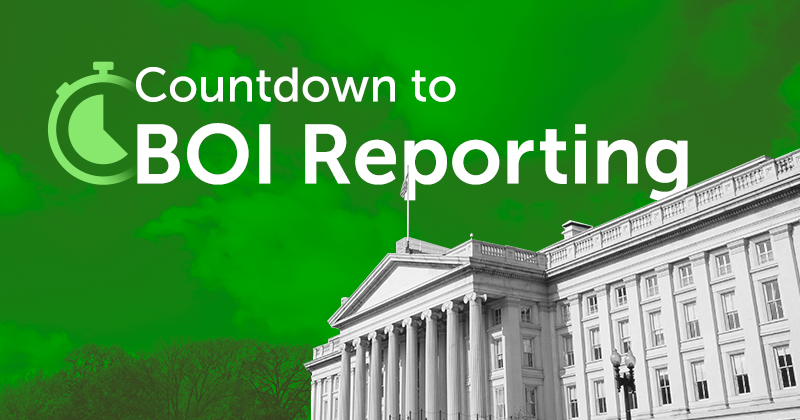-
Software
Compliance Software
Oversee licenses, track renewals, access documents, and more from a single interface.
Software Overview -
Services
Compliance Services
Full service compliance solutions for organizations throughout their entire lifecycles.
Services Overview -
Industries
-
Partner
- Information Center
Countdown to BOI Reporting: Current Corporate Transparency Act Timeline

We’re less than a month away from the Corporate Transparency Act (CTA) coming into effect. While it may feel like Beneficial Ownership Information (BOI) reporting requirements have come out of nowhere, the rules have been developing over several years. This blog post will detail the history of the requirements to help you prepare for the changes that will impact your organization.
Understanding the Significance
The CTA plays a crucial role in promoting transparency and combating financial crimes. As part of this act, businesses will be required to report beneficial ownership information, unveiling the individuals who ultimately control and benefit from the company.
The Journey of the Corporate Transparency Act
For context, let’s take a step back and explore the journey of the Corporate Transparency Act.
- January 2021: The CTA was included in the Anti-Money Laundering Act of 2020 as part of the 2021 National Defense Authorization Act. It required businesses to report BOI to FinCEN.
- December 2021: FinCEN missed a Notice of Proposed Rulemaking to allow the public to review and comment on the proposed rule to implement the CTA’s BOI reporting requirements.
- September 2022: FinCEN released the Final Rule on Beneficial Ownership Reporting (BOI), designed to clarify which entities would need to report BOI and by what deadlines.
- December 2022: FinCEN released a second proposed rule that detailed access protocols for authorized users of BOI and invited comments on it.
- March 2023: FinCEN released a set of BOI FAQs to address common questions and concerns BOI FAQs.
- September 2023: FinCEN released a Compliance Guide designed to assist small businesses in determining their obligation to report beneficial ownership information. Additionally, FinCEN proposed changing the filing window for entities formed or registered in 2024 from 30 days to 90 days.
- October 2023: The deadline for submitting comments on the proposed reporting extension, as well as on the BOI reporting form and FinCEN Identifier, was October 30, 2023.
- November 2023: FinCEN confirmed that the filing window for entities formed or registered in 2024 would officially be changed from 30 days to 90 days.
- January 2024: The CTA is expected to come into effect, activating the following deadlines:
- Companies formed or registered before 2024 must file an initial report by January 1, 2025.
- Companies formed or registered during 2024 must file an initial report within 90 days of approval.
- Companies created or registered after 2024 must file an initial report within 30 days of approval.
Preparing for the Changes
As we approach the implementation date of January 1, 2024, businesses and professionals must be prepared for the upcoming changes. Here are some steps you can take to ensure compliance:
- Stay informed: Continuously monitor updates and guidance provided by FinCEN to stay up to date with any changes or clarifications.
- Seek guidance: Consider consulting with legal professionals or compliance officers specializing in BOI reporting to ensure you meet the requirements.
- Take early action: Get started today by gathering details about your beneficial owners. Harbor Compliance’s BOI Reporting Service offers guided information collection, and ordering today will allow you to sidestep deadline monitoring obligations.
Act Now: The BOI Reporting Deadline Is Closer Than You Think
Compiling the information for BOI reports is a tedious, time-consuming process that can’t be rushed. The Financial Crimes Enforcement Network (FinCEN) has emphasized that the companies that submitted the first four million reports spent an average of two to four months gathering the necessary data. With the BOI filing deadline rapidly approaching, entities have far less time than they realize to meet this legal requirement.
FinCEN has consistently emphasized that the BOI reporting deadline will not be extended, so you need to act fast. Many entities will likely wait until the final months, resulting in an overwhelming influx of submissions. Government systems, which are not designed to handle such surges, will experience glitches, crashes, or other disruptions.
If your entity misses the filing deadline, you will violate the Corporate Transparency Act and face severe penalties of $591 per day. To avoid these substantial fines, partner with a trusted BOI expert like Harbor Compliance and ensure accurate, timely BOI report submissions.
When you sign up for Harbor Compliance’s BOI reporting service, you’ll gain access to an intuitive online portal that will guide you through the entire process and help you gather all the required BOI information.
Time is Running Out—Start Gathering Your BOI Information Today
The Harbor Compliance team is here to ensure that your entire BOI filing process is handled with utmost precision. We will file your BOI reports within 48 hours of receiving the required information so you can focus on other business-critical tasks.
Get started with Harbor Compliance’s BOI Reporting Service today
In Conclusion
The Corporate Transparency Act and the subsequent BOI reporting requirements mark a significant shift towards greater transparency and accountability. Businesses and professionals need to understand the importance of BOI reporting and its impact on their operations.
If you have any questions or need assistance with compliance, please contact our expert team. We can embrace these changes and foster a more transparent business environment.




